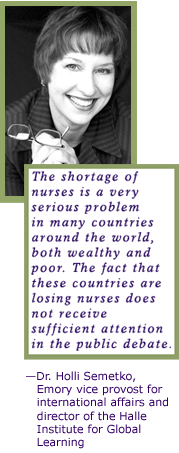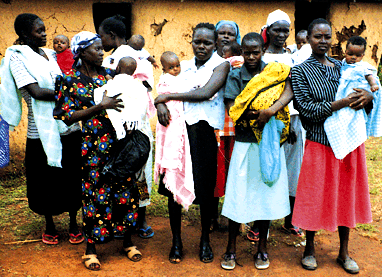
 |
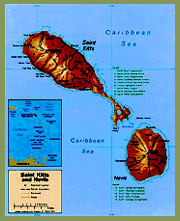 |
|
||||||
| Others are participating as well, including the Pan American Health Organization (PAHO), the University of the West Indies, Johnson & Johnson, and the Lillian Carter Center for International Nursing, based in the Nell Hodgson Woodruff School of Nursing at Emory. In conjunction with the campaign, all of these partners are using their collective energy to recruit and retain more nurses and strengthen nursing and midwifery services. For CNO President Delores Gumbs, the Year of the Caribbean Nurse is cause for recognizing something else. She regards the campaign as “a model for other regions throughout the world. This is an example of what vision and commitment to the well-being of people and partnerships that cross boundaries can achieve.” Those words are especially compelling to Gumbs and Dr. Marla Salmon, dean of the School of Nursing and director of the Lillian Carter Center. Both were present in 2001 when Dr. Jean Yan, a PAHO official based in Barbados, stood before the center’s first Global Nursing Partnerships Conference in Atlanta and described a growing health care crisis in her part of the world. An alarming number of skilled nurses were leaving the Caribbean for better pay and working conditions in the United States, Canada, and Great Britain, resulting in a critical workforce shortage at home. That combined with the challenges of dealing with HIV/AIDS and a faltering economy had put the region on the brink of disaster unless someone initiated a plan to turn things around. Despite the grim assessment, nursing leaders saw an opportunity to join together to make a difference. In the months following the conference, Lillian Carter Center faculty, students, and staff worked behind the scenes to form alliances involving a major US corporation 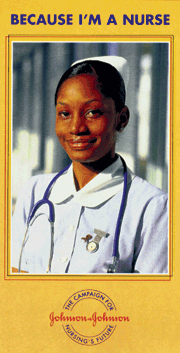 and nurses’ organizations and government leaders in the region.
Various groups with a stake in the outcome thus began to talk about how
to improve the situation. The collaboration, a direct result of the Global
Nursing Partnerships Conference, led to a marketing campaign sponsored
by Johnson & Johnson to recruit and retain skilled nurses in the Caribbean
and boost their public image and self esteem. In addition, the Lillian
Carter Center is providing technical assistance, educational opportunities,
and a website for nurse leaders in the region.
and nurses’ organizations and government leaders in the region.
Various groups with a stake in the outcome thus began to talk about how
to improve the situation. The collaboration, a direct result of the Global
Nursing Partnerships Conference, led to a marketing campaign sponsored
by Johnson & Johnson to recruit and retain skilled nurses in the Caribbean
and boost their public image and self esteem. In addition, the Lillian
Carter Center is providing technical assistance, educational opportunities,
and a website for nurse leaders in the region.“We made the case that the problems are extremely severe in the Caribbean,” says Salmon of their strategy. “The health issues that are emerging in the Caribbean are worsening rather than improving, and the United States is a major importer of Caribbean nurses. So, in a sense, the ingredients for disaster are right in our backyard.” So many nurses are leaving the Caribbean—the vacancy rate is 35%—that the current workforce is comprised primarily of new graduates and nurses who are ready to retire, according to Yan, who presented a plan to manage nurse migration at the Atlanta conference. Missing are highly trained, experienced, and specialty nurses. Of the vacancies, 70% are nurse midwives, Yan says. Thus the public has significant concerns and insecurities about the availability, safety, and quality of health care. 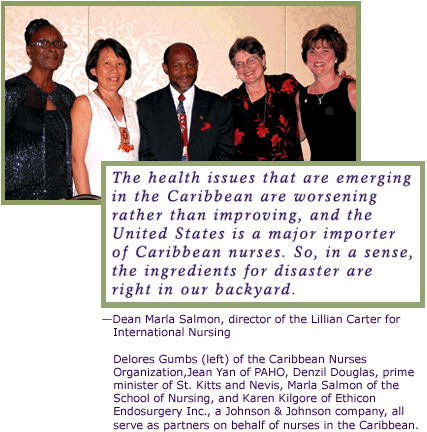 |
||||||||
“I had absolutely no plans whatsoever to expand the US campaign to the Caribbean,” says Nancy Lewin, then executive director of the Campaign for Nursing’s Future at Johnson & Johnson. “In fact, it never would have happened. Marla talked to me at length about how important this campaign would be to the people of the Caribbean. Then she introduced me to Dr. Jean Yan of PAHO, and the three of us felt a burning need to help the nurses and the people of the Caribbean.” Yan and Gumbs of the CNO also served as advocates for change by opening doors in the Caribbean for discussions with government leaders about the nursing shortage. In 2002, Salmon 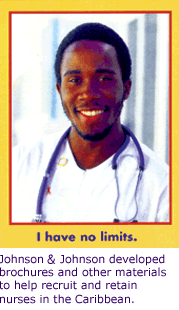 attended a meeting of the CNO, which has representatives from 26 countries.
She shared print and video materials from Johnson & Johnson’s
US nurse recruitment campaign with nurses and with the prime
minister and the health minister of St. Kitts and Nevis, where the CNO
meeting was held. Dr. Denzil Douglas, the prime minister, is a physician
and health care leader in the region. He too became a major player in
convincing government leaders to embrace a plan to keep nurses in the
Caribbean.
attended a meeting of the CNO, which has representatives from 26 countries.
She shared print and video materials from Johnson & Johnson’s
US nurse recruitment campaign with nurses and with the prime
minister and the health minister of St. Kitts and Nevis, where the CNO
meeting was held. Dr. Denzil Douglas, the prime minister, is a physician
and health care leader in the region. He too became a major player in
convincing government leaders to embrace a plan to keep nurses in the
Caribbean.The Lillian Carter Center marshaled other resources as well. Rachel Shaw, 03N, then-president of the Emory International Student Nurses Association (EISNA), helped Salmon develop a marketing survey and collect information about the suitability of images, music, and messages for a recruitment campaign. They analyzed the information and sent it to Johnson & Johnson for consideration. Everyone’s hard work paid off. By January 2003, Johnson & Johnson was committed to the project, and company officials joined Salmon in St. Kitts and Nevis to assist a production crew with filming nurses in hospitals, clinics, nursing schools, and private homes. Within a couple months, Johnson & Johnson produced “The Year of the Caribbean Nurse” campaign, which includes a recruitment video, television commercials, and posters. The video, set to a catchy reggae jingle called “They Dare To Care,” features real nurses, in uniform, speaking in their own words about the work they do. The campaign strives to encourage young people of the Caribbean to go to nursing school, become nurses, and stay in their countries to work. “It is also meant to make nurses and their families feel good about themselves,” says Lewin. The prime ministers of each Caribbean country agreed to broadcast the commercials and recruitment video at no charge, she adds. Such work is “pioneering and very important for correcting imbalances on an international scale,” notes Dr. Holli Semetko, Emory’s vice provost for international affairs. “The shortage of nurses is a very serious problem in many countries around the world, both wealthy and poor. The fact that these countries are losing nurses does not receive sufficient attention in the public debate.” |
||||||||
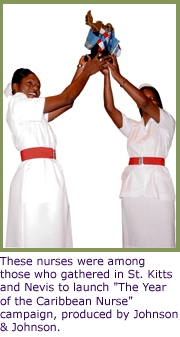
partners also seek to expand opportunities for nursing education. The School of Nursing is recruiting Caribbean students, with the understanding they will return home to work after earning their degrees, and placing Emory nursing students and new graduates in the Caribbean—“in a sense reversing the immigration trend,” says Salmon. Leila W. McWhinney-Dehanney is a perfect example. Now a second-year doctoral student at Emory, she plans to return to Jamaica to advance nursing education and health policy in her country and the region. This spring, Emory nursing faculty accompanied 12 seniors and graduate students to the British Virgin Islands for an academic exchange, initiated by Lee Mathavious, the chief nursing officer there. Among those who helped organize the trip was Bernet Scatliffe, an Emory nursing graduate student from the British Virgin Islands and a colleague of Mathavious. Also this spring, students took part in volunteer service learning in Jamaica and the Bahamas. Their activities were funded by a grant from the O.C. Hubert Charitable Trust that provides fellowships for students to assist faith-based organizations working with vulnerable populations in other countries. (See related story in News Briefs.) The Lillian Carter Center’s work in the Caribbean builds on the school’s partnerships with the Rollins School of Public Health, The Carter Center, the Centers for Disease Control and Prevention, The Task Force for Child Survival and Development, and others. In many respects, the missions of The Carter Center and the Lillian Carter Center (named for former President Jimmy Carter’s late mother, a nurse and Peace Corps volunteer) overlap. Both seek to initiate partnerships and self-sustaining projects that improve health worldwide. The Lillian Carter Center works “where the need is greatest,” providing nursing students and faculty with valuable learning experiences while educating others in the process. “We have the potential—and the obligation—to do that on a global level,” says Salmon. Nursing senior Emily Mason is experiencing that potential firsthand. This past fall, Mason attended the first meeting of the Caribbean Student Nurses Organization, sponsored by the CNO, in Antigua. Mason met with student leaders and offered to help them begin formalizing their organization. “I connected with a lot of students,” says Mason, the current president of EISNA. “I helped answer their questions about starting a student nursing organization. There is a great need because the Caribbean is so large and the students are far apart. We also identified issues to address, including how we as future nurses can retain nurses in the hospitals and communities there.” For Mason, there is no better place than the Lillian Carter Center in the School of Nursing for exploring those possibilities. |
||||||||
|
|
||||||||
|
|
Consistent
with its mission to improve the health of vulnerable people worldwide
through nursing education, research, practice, and policy, the Lillian
Carter Center for International Nursing is active in Caribbean nations
and half a dozen other countries. It also works closely with governmental
chief nursing officers in more than 80 countries and administers all
School of Nursing international activities. A partial listing of these
efforts follows. |
|||||||
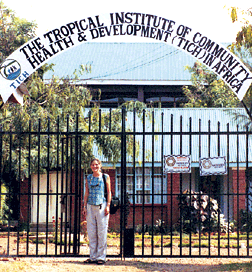 Chassea Golden is the first student to enroll in a new international health
program leading to dual master's degrees in nursing and public health.
Golden is shown at the Tropical Institute of Community Health and Development
in Kenya.
Chassea Golden is the first student to enroll in a new international health
program leading to dual master's degrees in nursing and public health.
Golden is shown at the Tropical Institute of Community Health and Development
in Kenya. |
||||||||
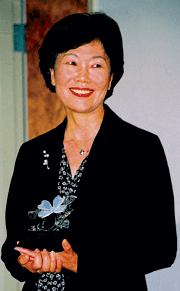 Dr. Cho Ja Kim, professor of nursing at Yonsei University in South Korea, visited Emory last spring as part of an academic exchange between both schools. |
CANADA
AND SOUTH KOREA This past fall, faculty members Drs. Sandra Dunbar and Lynn Sibley took part in a new academic exchange with the University of Alberta in Canada. The first two Emory nursing students are studying there this spring. Three years ago, the School of Nursing began an academic exchange with Yonsei University College of Nursing in South Korea. CUBA Since 2002, students and faculty have traveled to Cuba each January to study the health care system in Cuba, under the auspices of MEDICC (Medical Education Cooperation with Cuba), a partner of the Lillian Carter Center that is housed in the School of Nursing. GERMANY AND INDIA Annually, nursing faculty take part in study abroad programs in Germany and India, sponsored by the Halle Institute for Global Learning at Emory. The program involves faculty from across the university who immerse themselves in all aspects of the country they visit, including health care. MIGRANT FAMILY HEALTH For the second year, 20 undergraduate and graduate nursing students traveled to South Georgia last June for the Farm Worker Family Health Program. Students and faculty collaborated with nursing and other health science colleagues from Georgia State, Kennesaw State, Clayton State, and Darton College to render health care to migrant and seasonal farm workers and their families. Nearby, four family nurse midwifery students and one nurse midwifery/master of public health student took part in the South Georgia Migrant Health Project, led by the Physician Assistant Program in the School of Medicine. MSN/MPH INTERNATIONAL HEALTH PROGRAM This innovative program offers a course of study in international health that leads to dual master’s degrees in nursing and public health. Chassea Golden enrolled as the first student in fall 2002, and five new students joined her in fall 2003. Directed by Dr. Lynn Sibley, the program targets nurses with experience in international health, international nursing leaders who want to incorporate public health and nursing into practice and/or nursing curricula in other countries, and nurses interested in working for governmental and nongovernmental organizations, including those that are faith-based. Students from the United States and other countries participate in the program. To learn more about the Lillian Carter Center and its programs, call (404) 727-3130 or send an e-mail to lccin@nursing.emory.edu. |
|||||||
TOP |
||||||||
current issue . past issues . contact us . from the dean news briefs . milestones . class acts . alumni news Copyright © Emory University, 2004. All Rights Reserved |

